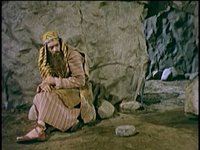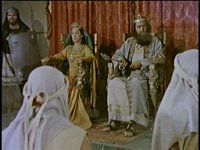Slaves of Babylon (1953)

Despite having been the subject of some of the very earliest Bible films, the various stories from the Book of Daniel rather fell from favour, to the extent that Slaves of Babylon is the only feature length take on one of the Israel's most iconic prophets (barring a handful of operas and musicals). Even on this occasion the filmmakers didn't take a huge amount of interest in the biblical subject matter and instead shift the focus to a fictional character called Nahum (Richard Conte). Nahum is one of the more rebellious Jewish slaves in post-exilic Babylon and so, after a couple of early skirmishes with the Babylonian authorities, Daniel sends to convey God's message to Cyrus (Terry Kilburn).
By this stage Daniel (Jewish actor Maurice Schwartz who would also feature in Salome in the same year) is now getting on in years and perhaps, given the filmmakers were clearly happy to use creative licence with the text, it might have been better to have been more relaxed on this point and create an all round action hero than to introduce a whole new character who inevitably steals the show. Nahum's mission is to find Cyrus who at this point is still just a shepherd, convince him of his divine mandate, teach him in the art of becoming a king, manage his campaign to make him and lead his attack on Babylon.
Various obstacles stand in Cyrus's way, not least and attempted assassination at the hands of a exotic dancer played by future Catwoman Julie Newmar who uses her feline charms to attempt to take Cyrus' life. It's a plan that not even Newmar's most famous role would have dared to pull off and is thwarted by the ever alert Nahum. Cyrus does seem to have an eye for the ladies though and his obsession with Linda Christian's princess does rather distract him from the task at hand.

Interspersed with this main plot are various stories from the early part of the Book of Daniel, his night, unharmed in the lion's den; Nebuchadnezzar's madness resulting in him eating grass; and Shadrach, Meshach and Abednego being saved from the flames of the furnace. And of course there's the pivotal moment where Belshazzar's feast is interrupted by a giant hand writing "Mene, mene, tekel upharsin" on the walls of the banquet hall to prophesy his downfall. The special effects leave something to be desired - this latter scene relying on broadly the same technique (projection) as Pathé's Le Festin de Balthazar from 1905).
One of the episodes from the Book of Daniel that the film does leave out is the story about how Daniel and his colleagues choose not to eat the Babylonian's food, opting instead for a diet based largely on vegetables. It's not a story rich in dramatic potential, but it does really set Daniel and his friends apart from modern Christians. The film's costume design does place a very prominent Star of David across Daniel's chest, but otherwise Daniel is not particularly Jewish (as opposed to proto-Christian). But then also missing is the incident where Nebuchadnezzar dreams of a statue and none of his advisers can decipher it. None, that is, except, Daniel. It's perhaps not surprising that the second half of the Book of Daniel - the apocalyptic part - is absent, but this first omission does rather strip him of the gift that caused him to rise to prominence in the first place - the gift of interpreting dreams.
Whilst Slaves of Babylon was the product of a major studio (Columbia) it's fairly low budget and it shows. None of the male stars have any charisma, though Christian and Newmar do make up for the deficit to some extent, and whilst the plot adds a little excitement and allows a more tangential exploration of the story, it ends up compressing both stories so much that neither retains that much interest.
Labels: 1 and 2 Kings, Daniel


















.jpg)
.jpg)



.jpg)






















